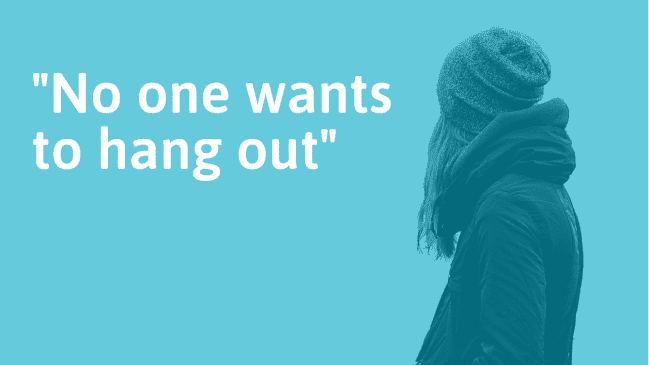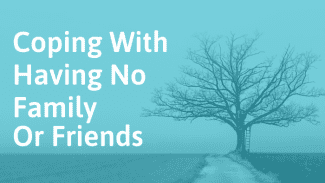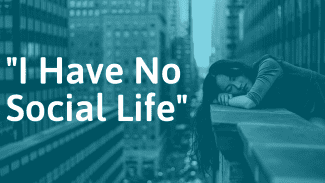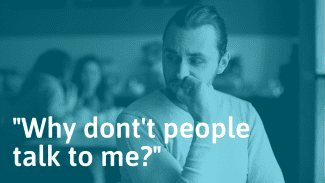To build and maintain a friendship with someone, you need to spend time together. But what should you do if everyone you know is uninterested in meeting up?
If you’re asking yourself, “Why do none of my friends ask to hang out?” this list of reasons will help you understand why.
1. Not taking the initiative
Rejection is emotionally and physically painful; we literally feel it in our bodies.[1] It’s natural that you’d prefer to avoid it. Unfortunately, unless you learn to take a risk and accept hearing a “no,” you’ll never get a “yes.”
Practice asking people to hang out. The more you do it, the easier and more natural it feels, and the less likely you are to be hurt when someone declines your invitations.
Improving your self-esteem may also help you deal with rejection. If you believe you are a worthy person, rejection might not seem so bad because you know that it doesn’t reflect badly on you.
2. Being too negative and not much fun to be around
Happy people are more likely to be involved in regular social activities and have more satisfying friendships than unhappy or anxious individuals.[2] People like to be around others who make them feel good. You don’t need to be overly cheerful or upbeat, but try to avoid complaining or whining.
If you are depressed or anxious, other people will pick up on it. Mental illness isn’t a character flaw or anything to be ashamed of, but it can hold you back socially. See your doctor for advice about therapy, medication, or both.
We recommend BetterHelp for online therapy, since they offer unlimited messaging and a weekly session, and are cheaper than going to a therapist's office.
Their plans start at $64 per week. If you use this link, you get 20% off your first month at BetterHelp + a $50 coupon valid for any SocialSelf course: Click here to learn more about BetterHelp.
(To receive your $50 SocialSelf coupon, sign up with our link. Then, email BetterHelp’s order confirmation to us to receive your personal code. You can use this code for any of our courses.)
3. Having friends who are genuinely too busy to hang out
In general, people prioritize socializing when it matters to them. But sometimes, your friends may not have time. In one study, 29% of participants said they didn’t have enough time for friendships.[3]
If they’ve just changed jobs or have had their first baby, you may not be your friends’ priority for a while. Use this time to meet some new people. If you have a friend who is going through a big transition, let them know you’ll be happy to hang out when they have space in their schedule. It’s normal for friendships to ebb and flow. You haven’t necessarily lost your friend forever.
4. Not making specific plans
Asking someone whether they’d like to meet up is only the first step toward spending time together. When you ask someone to hang out, don’t end the conversation without committing to a date, time, and activity. Otherwise, the other person may assume that you aren’t really serious about wanting to hang out. If you are making plans more than a week in advance, send them a message the day before you are due to meet up. Some people are forgetful and need a reminder.
5. Declining too many invitations in the past
No one likes to be rejected. If you have turned down other people when they wanted to hang out with you, they will logically assume you don’t want to be invited in the future. You may need to address the issue directly with your friends. Tell them that although you haven’t been able to hang out on previous occasions, you’re making your social life a bigger priority these days.
Attend as many social events as possible. You won’t necessarily enjoy all of them. However, they are all opportunities to practice your social skills.
Here’s our guide on how to be more social.
6. Being too judgmental or argumentative
Do you know how to have a respectful and friendly conversation, or do you try to “win” every argument? Debating can be fun, but people probably won’t want to hang out with you if you are overconfident, arrogant, and too interested in your own views to listen to anyone else.
When someone disagrees with you, try to keep your tone polite and thoughtful rather than confrontational. Tell yourself, “That’s interesting. I wonder what I can learn from this discussion,” instead of “I’m going to prove them wrong!” People who show empathy for others are more likable.[4]
If you find it hard not to judge people, you might like this article with tips to be less judgmental.
7. Not being sensitive to your friends’ needs and preferences
If you ask someone to do something that is far beyond their comfort zone, they are more likely to decline your invitation. Consider their personality type before asking them to hang out.
For example, if you want to hang out with an introverted friend, it probably isn’t a good idea to invite them to a party or anywhere noisy and overstimulating. A coffee shop, museum, or a hike would be a better choice. If you aren’t sure what your friend would prefer, suggest two or three options and ask them to pick one.
8. Being taken for granted by your friends
Sometimes, one person in a friendship group becomes the “group organizer.”
If you have fallen into this role, it may be time for a frank talk with your friends. Tell them that although you like spending time with them, you think it’s someone else’s turn to choose when and where everyone hangs out. Keep the conversation light-hearted, but make it clear that someone else will have to organize the next event.
If nothing changes, it may be time to look for new friends who understand that in healthy relationships, both people make an effort to reach out and arrange meetups.
Here’s our guide on how to find like-minded friends.
9. Boring other people
Research shows that boring people tend to:[5]
- Talk about themselves all the time.
- Talk about their problems at length while showing no regard for other people.
- Try to be witty or flattering to win other peoples’ approval.
- Maintain a serious demeanor.
- Show low levels of enthusiasm.
- Stick to trivial topics all the time or repeat themselves (small talk is important as a social lubricant, but meaningful conversations involve questions and self-disclosure around more meaningful subjects).
- Speak slowly.
- Remain passive in conversations and are slow to put their own opinions forward.
To avoid making people feel bored, show interest in others by asking questions about their lives, views, and experiences.
10. Being too needy
Friends give and receive emotional support, but if you treat your friends like therapists, you may drive them away. Make it clear that you don’t just see your friend as a listening ear. Balance time for talking with other activities like bowling or seeing a play that will give you both something positive to focus on.
Try not to rely on one person when you’re having a tough time. Even if they are a close friend who wants to help, there’s a chance you could leave them feeling emotionally exhausted. Consider turning to a support group, therapist, or listening service if you need to unburden yourself.
We recommend BetterHelp for online therapy, since they offer unlimited messaging and a weekly session, and are cheaper than going to a therapist's office.
Their plans start at $64 per week. If you use this link, you get 20% off your first month at BetterHelp + a $50 coupon valid for any SocialSelf course: Click here to learn more about BetterHelp.
(To receive your $50 SocialSelf coupon, sign up with our link. Then, email BetterHelp’s order confirmation to us to receive your personal code. You can use this code for any of our courses.)
11. Being aloof or appearing unapproachable
If you appear aloof or disinterested, people may assume that you prefer to be alone.
Think about how friendly people behave. Learn from them. Practice making eye contact and smiling when you greet people and say goodbye. Be aware of your facial muscles. If you tense up, you’ll appear anxious or disinterested.
Show that you are willing to keep a conversation going by giving expanded answers when someone asks you a question. For example, if a work colleague says “Did you have a nice weekend?” don’t just say “Yes.” Tell them what you did, then ask them the same question in return.
See this guide for more tips on how to appear friendly.
12. Trying to make friends with people who feel they can’t relate to you
Research shows we tend to prefer to spend time with people who are like us.[6] Similarity can make us feel comfortable. Some people might think you are a nice person yet not want to hang out with you because they don’t believe you have enough in common.
Try to meet people who share your interests. Joining a club or society that centers around a hobby or activity. If you invite someone from the group to hang out, they will know that you both have at least one thing to bond over.
13. Repeatedly bringing other people with you to social events
If you want to bring your partner or another friend along, say so. Some people find it unsettling to meet up with a friend, only to then find that they have to spend time with someone they have never met before.
Your friend may not feel comfortable telling you that they’d rather hang out one-on-one, and just decline your future invitations. This is more likely to happen if your friend is an introvert. Don’t be offended if they only want to hang out with you; we all have different social styles. In time, they may be more open to meeting other people in your life.
…
We cover several tips on how to make friends even if you have only a few or none to start with.






Wow, this is possibly one of the most ignorant articles I’ve ever had to instantly skip reading.
I feel like common decency and reciprocity are severely lacking in society; I’m finding since the pandemic people more input-oriented (selfish) than output-oriented (selfless), and that show up at work, in families and friendships. There are a ton of new things competing for people’s time e.g., social media, podcasts, streaming media, movies, texting that weren’t part of the norm 25-years ago. Perhaps because I don’t do any of that, with the exception of occasional texting, I have much more free time than others. I invite members of my family to enjoy sporting events and concerts but never do they ask me to join them; I ask friends for a night out but their wives are controlling and don’t want their husbands hanging out with a guy who’s a “bad influence” because he’s divorced. The solution to the problem is to invest in yourself and find new friends that share common interest; the best way to do that is continuing your education or getting involved with local affinity groups (outdoor recreational; indoor gaming) or joining organizations such as Freemasonry and the Knights of Columbus, rolling up your sleeves and getting deeply involved.
Felt more like POINTED AT rather than SOLVED
30 yr friendships that come to an end when I am not invited but I am always inviting. When others get priority over me, when our daughters are no longer encouraged to hang out with each other one has to wonder, why am I not asked to hang out? The hardest part is my Covid boundaries are more strict than my friends and now everyone has gone back to do whatever, and I am not.
I try to make plans with people and they keep saying we will figure something out then nothing
Feels like nobody likes me. I love being with my friends, but always when I ask someone out, they say no. I ask why, but nobody answers. Also, nobody almost NEVER calls, texts, or wants to play with me. I kinda have social anxiety, so it’s hard to make new friends. I hope someone can relate to this, cause I don’t want them to feel like they’re alone with this.
No one talks to me, they play with other people and never me, and they all can never play. And for some reason, everytime i ask for them to play, “Nope im busy.” “With what?” “Work.”
Why would I want or need to change who I am to gain peoples acceptance? If they don’t want to be around me, that’s their problem.
Yes, not all people should hang out with each other, but some of us need to have a chat or hang out with other people once in a while. That’s why someone may end up here, to see what’s going wrong that they can’t the amount of socializing they need.